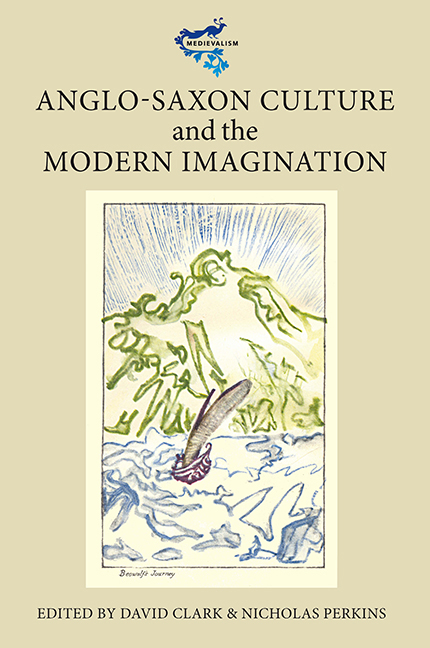Book contents
- Frontmatter
- Contents
- List of Illustrations
- Contributors
- Foreword
- Acknowledgements
- Abbreviations
- Introduction
- 1 From Heorot to Hollywood: Beowulf in its Third Millennium
- 2 Priming the Poets: The Making of Henry Sweet's Anglo-Saxon Reader
- 3 Owed to Both Sides: W.H. Auden's double debt to the literature of the North
- 4 Writing for an Anglo-Saxon Audience in the Twentieth Century: J.R.R. Tolkien's Old English Chronicles
- 5 ‘Wounded men and wounded trees’: David Jones and the Anglo-Saxon Culture Tangle
- 6 Basil Bunting, Briggflatts, Lindisfarne, and Anglo-Saxon Interlace
- 7 BOOO Seeing Beowulf in Pictures and Print
- 8 Window in the Wall: Looking for Grand Opera in John Gardner's Grendel
- 9 Re-placing Masculinity: The DC Comics Beowulf Series and its Context, 1975–6
- 10 P.D. James Reads Beowulf
- 11 Ban Welondes: Wayland Smith in Popular Culture
- 12 ‘Overlord of the M5’: The Superlative Structure of Sovereignty in Geoffrey Hill's Mercian Hymns
- 13 The Absent Anglo-Saxon Past in Ted Hughes's Elmet
- 14 Resurrecting Saxon Things: Peter Reading, ‘species decline’, and Old English Poetry
- Index
14 - Resurrecting Saxon Things: Peter Reading, ‘species decline’, and Old English Poetry
Published online by Cambridge University Press: 20 April 2017
- Frontmatter
- Contents
- List of Illustrations
- Contributors
- Foreword
- Acknowledgements
- Abbreviations
- Introduction
- 1 From Heorot to Hollywood: Beowulf in its Third Millennium
- 2 Priming the Poets: The Making of Henry Sweet's Anglo-Saxon Reader
- 3 Owed to Both Sides: W.H. Auden's double debt to the literature of the North
- 4 Writing for an Anglo-Saxon Audience in the Twentieth Century: J.R.R. Tolkien's Old English Chronicles
- 5 ‘Wounded men and wounded trees’: David Jones and the Anglo-Saxon Culture Tangle
- 6 Basil Bunting, Briggflatts, Lindisfarne, and Anglo-Saxon Interlace
- 7 BOOO Seeing Beowulf in Pictures and Print
- 8 Window in the Wall: Looking for Grand Opera in John Gardner's Grendel
- 9 Re-placing Masculinity: The DC Comics Beowulf Series and its Context, 1975–6
- 10 P.D. James Reads Beowulf
- 11 Ban Welondes: Wayland Smith in Popular Culture
- 12 ‘Overlord of the M5’: The Superlative Structure of Sovereignty in Geoffrey Hill's Mercian Hymns
- 13 The Absent Anglo-Saxon Past in Ted Hughes's Elmet
- 14 Resurrecting Saxon Things: Peter Reading, ‘species decline’, and Old English Poetry
- Index
Summary
Peter Reading's position in contemporary British poetry is paradoxical. Born in Liverpool in 1946, Reading trained as a visual artist before publishing his first collection of poems, Water and Waste, in 1970. In outline Reading's career is deceptively reputable. As the winner of the Whitbread prize for poetry (1986), two Lannon awards for poetry, someone published regularly in established periodicals such as the Times Literary Supplement, and who has produced a Collected Poems (Bloodaxe, 1995–2003) his output seems both prestigious and prolific. Yet Reading's poetry, and the persona of ‘Peter Reading, poet’, is based on a fundamental opposition to the bourgeois certitudes of poetry and culture. His work is anomalous in the factionalized population of small presses, performance poets, and so-called ‘mainstream’ or popular poets. Reading is in his own words a ‘nasty man’. This statement is echoed deferentially by one critic who calls him an ‘enigmatic, recalcitrant, uningratiating poet’ whose work resists assimilation into mainstream poetry by its refusal to observe social, personal, or poetic niceties. Reading's work deliberately assaults the complacency of transcendence to which contemporary poetry is vulnerable. It also refuses the consolations of righteousness and intellectual solipsism found in British poetry's academic and political wings. Eschewing avant-gardism, intellectual verse and commercial success, Reading's work is exilic and misanthropic in a profound sense. His subject-matter is distinct in its disenchantment and preoccupation with ‘repetitive, avoidable violence, suffering and pity’. This concern extends from his earliest works and is found most recently in the collection −273.15 (2005), which proclaims humanity's responsibility for imminent global catastrophe. Tom Paulin sees in these works a ‘journalistic commitment to the present social moment’. This grimy perspective has led to Reading's being labelled ‘Britain's number one poet of the unpleasant’, ‘an unofficial laureate of a decaying nation’.
Yet Reading's work, for all its relentless modernity, is enmeshed in literary tradition. Reading cultivates similarities between the rebarbative satire of the Augustans and his own brutal documentary style and subject matter, citing Swift and Addison as his literary forebears. This chapter seeks to contextualize his extreme misanthropy via ‘Swiftian contempt’ accompanied by ‘an agonised sense of waste’. Such literary genealogy proffers a means of rescuing Reading's work from abject idiosyncrasy.
- Type
- Chapter
- Information
- Anglo-Saxon Culture and the Modern Imagination , pp. 255 - 278Publisher: Boydell & BrewerPrint publication year: 2010

